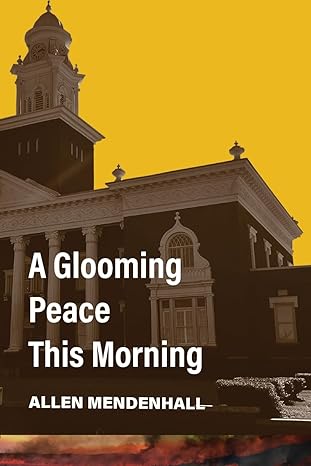
By Allen Mendenhall.
Livingston Press, 2023.
Paperback, 130 pages, $18.95.
Reviewed by Joshua S. Fullman.
Justice is a term frequently and haphazardly tossed around in contemporary parlance. Rather than rooted in the rich heritage of Plato’s discourses, St. Thomas Aquinas’s jurisprudence of definitions, or Burke’s sophisticated cultural analysis, justice has today become a noun imbued not with universal properties but has for its adherents a nebulous sense of moral certitude that seems always in quest of an adjective (social justice, environmental justice, fat justice). We recognize this does not diminish the qualitative ways in which justice can alternately be accomplished—as in procedural justice, retributive, compensatory, etc.—but we do acknowledge that as a linguistic tool of activism it is applied to legitimize any cause du jour. Rare is the thinker, then, who can narrow through the qualifiers and thoughtfully contend with competing claims. Rarer still the author who can do so in a narrative and challenge the reader to contemplate his own claims to morality. Yet Allen Mendenhall manages this feat in his recent debut novel.
A Glooming Peace This Morning tells the universal story of pubescent childhood in the particulars of 1970s rural Alabama. Its young narrator Cephas lives in self-consciously small-town Alabama, intentionally cut off from the greater concerns of Watergate and Vietnam, whose residents prefer their parochialism. This description of the South is not new, especially for those of us who have lived in its borderlines, but his generation must account for it in new ways unfamiliar to Confederate ghosts and college football devotees in other generations.
So when Cephas awakens to the biological call of manhood, he also becomes aware of the restrictive definitions of right and wrong adopted by his native Andalusia. His early experiences with trouble-making, drinking, and lust are simultaneously unique and familiar to many readers, which parallels and precipitates the conflict of the story. Over-attuned to the female sex, he grows resentful as the object of his affection, Sarah, settles her attention not on him but on an intellectually disabled young man, Tommy. When Cephas and his friends decide to retaliate by involving the local judge, they set off a chain of events from which emerges the more pervasive conflict between the letter and spirit of the law.
There are many strengths to recommend this novel. The narrator’s tone is world-weary, even as he reminisces fondly about the humorous events in his childhood. For he knows that even in the good of the South—its communal bonds, its traditional values, its simple lifestyle—lurks also the evils that hurt those who will not or cannot conform. As he looks back over that first teenage summer in Andalusia, he finds much to memorialize but much more to regret. The camaraderie of Cephas’ friends has both the youthful innocence expressed in Harper Lee’s To Kill a Mockingbird and the vanity and vulgarity expressed in Stephen King’s “The Body,” which was more memorably depicted in Rob Reiner’s Stand By Me (1986). There are many moments of strong description, even beauty, though gilded with sorrow. Indeed, the narrator is at his strongest when he is reflective. Several times throughout the novel, as the description of one vignette ends, he slips effortlessly into an essay mode that prompts his readers to reflection without moralism or pedantry.
The most challenging aspect of this work is the contemplation of justice demanded of the reader. Like John Grisham’s A Time to Kill, the audience feels the moral tensions and social obligations pulling them in multiple directions. Cephas, though not dispassionate to the inadvertent crime committed by Tommy and Sarah, is also not guiltless in his quest for righteousness. And neither, we discover, is the town, who would prefer mob rule or the manipulation of the law, merely to see their own will be done. The trial sequence, which is over far too quickly and lacks much of the expected courtroom drama, is so full of strange and unfamiliar procedural moves that it is one of the disappointing aspects of the book. But perhaps this is just the point. A quick trial, which minimizes due process in its quest for retributive justice, unbalancing the reader’s moorings and upsetting the scales, may be precisely the author’s intent. Perhaps its brevity is a thematic reminder of the unevenness of the law.
And while, in the mind of this critic at least, the final text means more to criticism than the author himself, we would be remiss to ignore the author’s background and purpose. Mendenhall, who holds a JD, an LLM, and a PhD in literature, is well equipped to handle his material. Serving as the Associate Dean of the School of Business at Troy University, Mendenhall lectures and appears regularly on television and podcasts speaking about liberty, economics, the justice system, and culture more broadly. He writes with an authoritative voice and a command of language that presents as both insider and observer. He understands rightly that justice is both a legislative end and a continuing discourse among interested communities, emphasizing not merely what kinds of goods we might seek but what is the highest good.
Ultimately, Mendenhall composes a compelling story highlighting the gray gaps where the law has not the acuity to locate justice, causing us to question our own complicity in our various small-towns and in the nation at large. Would we, he asks us, have cast the first stone? Would we have nailed Christ to the cross?
Joshua S. Fullman is Professor of English and Director of the Writing Center at California Baptist University. His academic work has appeared in journals like The North American Anglican and the Christian Libertarian Review. His debut book of poetry, Voices of Iona, is available from Wipf and Stock.
Support the University Bookman
The Bookman is provided free of charge and without ads to all readers. Would you please consider supporting the work of the Bookman with a gift of $5? Contributions of any amount are needed and appreciated!